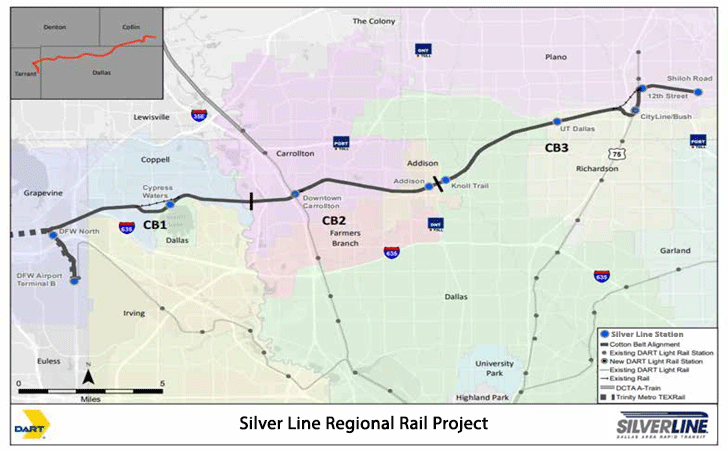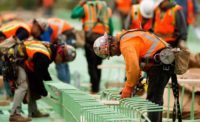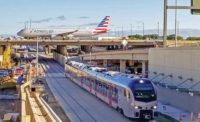Transportation
North Texas Commuter Rail Faces Cost Overruns Due to Dallas Delays

The DART Silver Line bridge over Central Expressway (US 75) in Plano advances.
Photo courtesy DART
Nadine Lee, president and CEO of Dallas Area Rapid Transit (DART), has warned Dallas officials that ongoing permitting delays and changes to the $1.9-billion Silver Line commuter rail are costing the transit agency as much as $150,000 per day. She told city council members that roughly $83 million in overruns could be deducted from an estimated $111 million in sales tax revenue the agency planned to return to the city,
During a council Transportation and Infrastructure Committee meeting on Feb. 28, Lee noted that DART has at times faced months of delays on plan reviews and approvals, despite requirements of timely turnaround by the city under the interlocal agreement.
“We have been trying to work with the city staff to get all of our plans reviewed and approved within the 10-day time period that was required in the previous [agreement] that you have already signed—that has not happened,” she said. “We have some plans that took 290 days to get a response. Lately, we've been working with them through the design review process and we are actually getting some turnaround. But it's still taking more than 10 days.”
Beyond design reviews, Lee said DART is also struggling to get construction permits approved. “That's something that, once we get through design approval, the construction permit should come quickly,” she said. “In some cases, we're going to the permit office to get the permit multiple days in a row and being turned away even though we have our plans approved.”
Gus Khankarli, director of the Dallas Dept. of Transportation, said most of delays were because changes to the Silver Line design must be in compliance with appropriate regulations.
"What we have been doing is complying with the city requirements, what the council has set out for us, as well as the technical requirements of federal rules, ADA compliance, and so on," he said.

DART represents 13 member cities that include Dallas. The 26-mile-long Silver Line extends across seven member cities: Grapevine, Coppell, Dallas, Carrollton, Addison, Richardson and Plano. The line was initially scheduled to begin service in late 2022. Completion is now estimated for late 2025. Although early delays were attributed to the pandemic, DART officials say cuty delays now hold up progress. Three miles of the route pass through Dallas.
“We've got seven cities that are touched by the Silver Line and the only concerns we've had, as far as delays or betterments that go above and beyond federal, state and local requirements, are with the city of Dallas,” said Gordon Shattles, spokesperson for DART.
Last November, DART's governing board announced it would provide the 13 member cities with $234 million in excess sales tax revenue that would be earmarked for transportation projects. Dallas was expected to receive $111 million that it planned to use for funding sidewalk improvements, ADA upgrades, traffic signal replacements and other items.
Since that announcement, DART and the city have discussing use of those funds for Silver Line overruns. According to Lee, the city now faces $83 million in lost sales tax revenue, which includes $50 million in costs due to delays and $33 million in betterments added to the scope of the project. That tally is expected to increase by about $150,000 per day, according to DART.
During the meeting, Dallas City Manager T.C. Broadnax pushed back against Lee’s claim, stating that neither he nor his staff would take an approach with a partner “to, in essence, threaten them with the non-issuance of permits for particular items.”
City Council member Cara Mendelsohn of District 12 took issue with the agency withholding sales tax revenue during the meeting, calling it “outrageous to think that DART would be the judge and jury" of whether there were delays "or if something's appropriate.”
The design-build contractor, Archer Western Herzog—a joint venture of Archer Western Construction and Herzog Contracting Corp—was given notice to proceed on the project in 2019. At that time, some agreements with stakeholders were still being finalized, with the pandemic making the effort even more challenging.
Among the most contentious aspects of the project are major crossings in Dallas, including lowering the roadway on Hillcrest Road to pass under the at-grade rail line. At Coit Road, a bridge will carry the roadway over the line.
The DART Board approved in 2018 a residential betterments program along the corridor where funds were allocated to add various improvements in addition to those required in the project's environmental approval. These included landscaping, aesthetic elements and elevating sound walls above the required amount.
Lee claimed during the meeting that city staff told DART that some betterments that were not required would need to be added to the project before permits would be approved. “Our understanding was that accepting some of these things would help us move our project forward, which it did not do. Shame on us for thinking that," Lee said.
Mendelsohn noted the addition of 15-ft-high continuous sound walls through residential neighborhoods in her district, which DART said is higher than required. “For the betterments, I'm just absolutely shocked that you would then try to take back sales tax money for things that were actually necessary for the council at the time to even approve this project,” she said.
To help address the costs of betterments, Shattles says DART is working closely with the city to see if any of those requested can be removed from the project before they are implemented.




